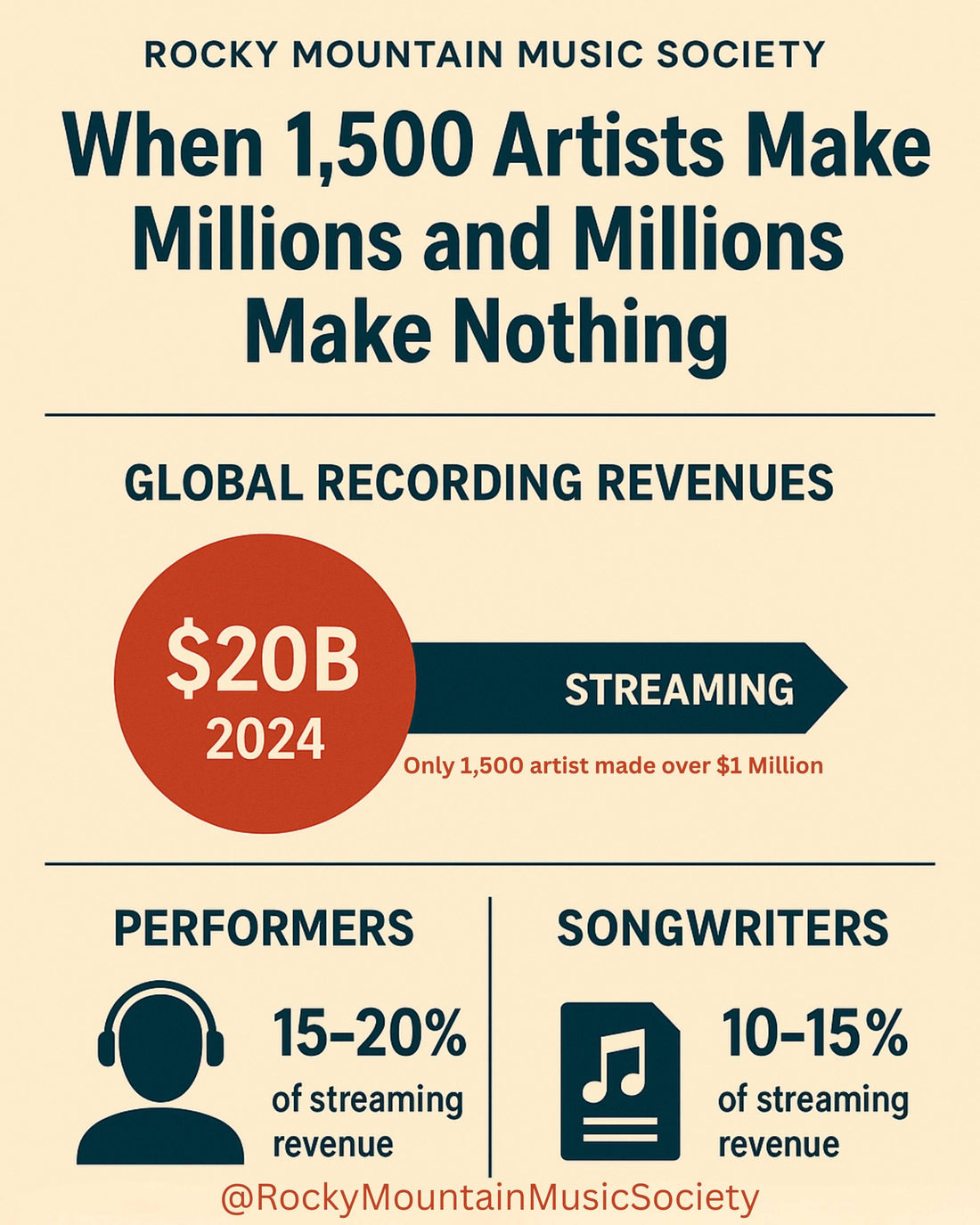
When 1,500 Artists Make Millions and Millions Make Nothing
The recorded music industry is stronger than ever—at least on paper. According to IFPI’s Global Music Report, worldwide recorded music revenues hit $29.6 billion in 2024, up nearly 5% from the previous year (IFPI, 2025). In the U.S. alone, revenues reached $17.7 billion, setting a new record (Axios, 2025). And what’s driving this surge? Streaming.
In 2024, streaming accounted for a staggering 69% of all global recorded music revenues, pulling in over $20 billion (Reuters, 2025). Paid subscription services like Spotify, Apple Music, and YouTube Music are the engines behind this growth, with more than 752 million paid subscribers worldwide (Music Business Worldwide, 2025). Clearly, streaming has become the music industry’s primary earning source.
But here’s the catch: while streaming enriches the industry, most performers and songwriters see only crumbs.
Who Really Benefits from Streaming?
Streaming platforms typically pay out around 70–75% of their revenue to rights holders, but how that money is divided is far from equal. Roughly 55–60% of the payout goes to the master recording rights—controlled by record labels and, in some cases, performers—while only 10–15% reaches the publishing side, which is then split among songwriters and their publishers (Music Business Research, 2024).
This means:
- Performers—especially those signed to major labels—may see some of the recording-side share, but contracts often reduce their take-home income. For independent artists, the cut can be better, but volume of streams is still the barrier.
- Songwriters sit at the bottom of the chain. Even though their work is the foundation of every recording, they share only a small fraction of streaming revenues, often less than a tenth of a penny per play. Their share is carved from the smaller publishing pool, making it especially hard to build sustainable income from streaming alone.
The Millionaire Illusion
Streaming services often highlight big payouts to prove their model works. For example, in 2024, Spotify reported paying billions in royalties. Yet, out of the millions of artists on the platform, only 1,500 artists worldwide earned over $1 million (The Guardian, 2025). That’s less than one-tenth of one percent of all acts. Meanwhile, just 4.4% of artists earned at least $131,000 a year—the kind of income needed to live comfortably as a professional musician.
For the overwhelming majority, streaming is simply not a sustainable income stream. Most performers still depend on touring, merchandise sales, teaching, or side jobs to get by. Songwriters, whose contributions are foundational, are often left in an even more precarious position.
Why Streaming Alone Doesn’t Work for Musicians
The problem isn’t just the tiny per-stream rates; it’s also the way money is distributed:
- Contracts: Many performers signed to labels see their share reduced further by recoupable expenses and unfavorable terms.
- Market share model: Streaming platforms distribute royalties based on overall market share, which means the biggest artists eat up most of the pie.
- Songwriter undervaluation: Despite writing the songs that fuel the entire industry, songwriters remain at the bottom of the pay scale (MIDiA Research, 2022).
This imbalance is why streaming, while lucrative for labels and platforms, is not a reliable or fair income stream for the majority of music creators.
The Path Forward
If we want a truly sustainable music ecosystem, performers and songwriters need a more equitable share of streaming revenues. Some proposals include:
- Adjusting splits to give songwriters more than their current sliver.
- Moving toward a user-centric payment model, where each listener’s subscription fee is divided only among the artists they actually listen to.
- Greater transparency in contracts and royalty reporting.
Until those changes take root, streaming may remain the industry’s biggest income source—but it will continue to leave most of the very people who create the music struggling to make ends meet.
At Rocky Mountain Music Society, we believe in advocating for fair compensation for all creators—because the health of music depends not on billion-dollar numbers, but on the sustainability of the artists and songwriters who give us the songs we love.
